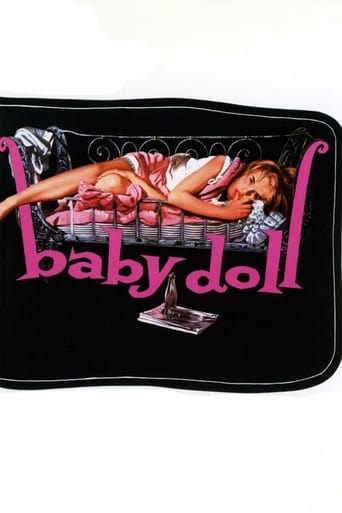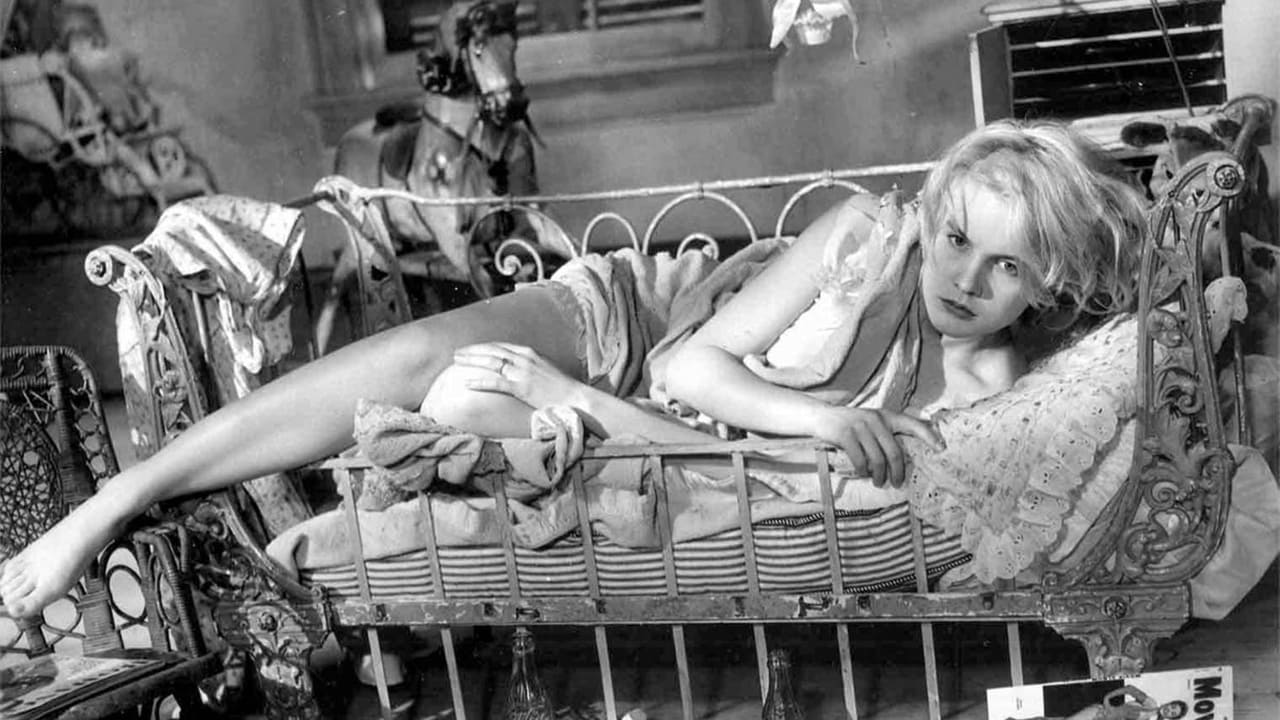dougdoepke
Two Southern rivals battle over cotton gins and dumb-as-a-rock wife.Seldom have so many theatrical heavyweights been responsible for such a misfire. The movie may have been cutting edge in the repressed 1950's, but the results are now almost unwatchable. It's impossible to tell what the movie makers had in mind outside of enraging public watchdogs with an iconic photo of a thumb-sucking Baby Doll (Baker). But, whatever their intentions, the movie's now mainly an exercise in the grotesque. I'm sure all the bluster and bellow are nowhere to be found in Karl Malden's Book of Fond Memories.For example, there's that horribly over-extended scene between Silva (Wallach) and Baby Doll that has to be one of the most excruciatingly overdrawn on record. The point is made in the first three-minutes, so why pointlessly drag it out for twenty, except maybe to fill empty screen time with some of the silliest shenanigans imaginable. Then too, much of that wasted time could have expanded the roles of such capable performers as Chapman, Torn, and especially Dunnock in a small part that unfortunately a hundred lesser actresses could have minced through. All I can say is if this was supposed to be sophisticated farce, the groans way out-number the chuckles.No need to go on, except to point out the one redeeming feature, namely, an unvarnished glimpse of the rural South you won't see in Gone With The Wind. Yes indeed, somehow I missed this mess back in '57. Now I know how lucky I was.
brefane
Perhaps because it's not based on one of his major works, Baby Doll(56) is one of the most successful films adaptations of Tennesese Williams' work. A combination of Tabacco Road, God's Little Acre and Lolita, Baby Doll is a sly, sultry comedy directed with perfect detachment by Elia Kazan. Kazan's attitude is like the townspeople watching the fire;he's an amused observer. The controversy surrounding the film partially explains why the bloated, cameo-studded Around the World in 80 Days won best picture while Baby Doll wasn't even nominated. Decades later it's clear, there wasn't another American film released in 1956 that was as original, daring, entertaining, outrageous or enduring as Baby Doll. The other films nominated for Best Picture of 1956 were Giant, Friendly Persuasion, The Ten Commandments, and The King and I. Kazan, Eli Wallach and Karl Malden were not nominated, but Carroll Baker and Mildred Dunnock were as was Williams' adapted screenplay. The actors here are every bit as impressive as those in Kazan's A Streetcar Named Desire(51), and nothing Baker did after Baby Doll comes within striking distance of her performance here. This was Baker's second film;she made her debut in Giant. Praise to Kazan's direction and Williams' dialog. Wallach in his film debut has never been better, his seduction of Baby Doll is breathtaking, and Malden is tremendous as Baby Doll's hapless husband Archie. With authentic atmosphere, arresting compositions and excellent cinematography, Baby Doll is a film classic complete with a controversial past.
jacegaffney
BABY DOLL is not a popular choice but in my opinion it is the best thing Tennessee Wiliams ever wrote. It's his loosest successful dramatization; his hair is down, yet it is the most symbolically lucid of his parables conveying the tragic predicament of the New South. If STREETCAR NAMED DESIRE's subtext was Stanley Kowalski raping the former genteel order in the form of Blance Dubois, here the sexual conceit is wittier and the question of where it is ultimately headed far more ambiguous. Film has a surprising resemblance to Bunuel's VIRIDIANA, but Williams' despairing anatomy lesson is less withholding than the proud Spanaird's; it's also funnier.Kazan's direction is typically loud and unsubtle (loudness for Kazan always equaled vitality), still, the approach in this rare instance is less pat than usual primarily because, though what Malden and Wallach do is pretty much expected, Carroll Baker's performance is a stunner - what "the Method" always preaches but seldom delivers: a fresh, consistently spontaneous response to the dramatic shifts in the story. Nice to see 'Gadge' not smothering everything with his oppressively obvious personality; instead, playing things out, actually curious where at least one of his characters might take him.Small-scale; far from perfect (in fact, large chunks of it play like the Carol Burnett-Vicki Lawrence "Mama's Family Show", but also purposefully shocking, outrageous and surprisingly good.Rating: 7.5Was this review helpful to you?
Jay Raskin
I first saw this film in the late 1960's at one of the great lower Manhattan revival art houses. They were a great place to get an education in cinema, usually showing a double feature for about $2. I must have been about 16 and I thought this film was about the sexiest I had ever seen. I immediately fell in love with Carroll Baker.Seeing it again more than 40 years later, it has lost some of its eroticism, but now I can appreciate Ms. Baker's terrific performance. (I was really surprised when I looked up her age and found that she was really 25 at the time and not 19 as she looks in the movie). In fact, all the main actors, Eli Wallach, Karl Malden and Mildred Dunnock are all wonderful in it.In the 1930's, there were a bunch of screwball comedies usually involving a wealthy man or his son falling in love with a young woman and interacting with her family of offbeat characters (e.g. "You can't take it with you."). Here Williams takes the formula but integrates it into his usual Southern environment and adds healthy douses of talk about sex and seduction. Only the wealthy man (Silva Varcarro) hasn't fallen in love with the young woman, he is just trying to seduce Baby Doll to get revenge for her husband (Archie Lee) setting fire to his cotton gin.The fact that Vacarro is Italian and an outsider in the good old boy community means that he can't get justice through the normal legal channels. He has to seek his revenge through the seduction of Archie Lee's young wife.Archie Lee is both disgusting and pitiable as a Southern aristocrat trying to prove his superiority and breeding, while his financed furniture is being repossessed, his gin mill machinery is broken down, and his wife refuses to let him consummate her marriage. If the film were remade today, I think that in order to enhance the satire and stay true to the spirit of the piece, instead of an Italian suitor, the role would have to be played by a black man. Of course, in 1956, the racists in the South still had enough power to prevent any such movie from even being considered.It is a little ironic that the Klan didn't protest the movie and shut it down because of its wicked satire on Southern well-bred gentlemen and virgin South bells, that was left to Cardinal Spellman and his gang of sexually repressed hypocrites in New York.



 AD
AD





